#Blockchain App Development
Explore tagged Tumblr posts
Text
How to Choose the Right AI Software Development Company for Your Business
Artificial intelligence (AI) is rapidly changing industries, revolutionizing how businesses used to operate. AI has not only automated several repetitive tasks but also has the capability to reveal valuable insights that help businesses make the right decision. There are several advantages of implementing AI development services into an organization. Integrating AI solutions into our systems not only automates routine tasks but also helps businesses stay ahead of their competitors. With the growing companies integrating AI solutions into their workflows, the number of AI software development companies providing AI development services has significantly increased. With so many AI development companies around, choosing the best AI software development company that meets your specific requirements becomes tricky.
That’s why we’ve curated this blog to bring you this comprehensive guide to the top AI companies in 2025.
What is AI App Development?
Developing an AI app involves building software applications using AI technologies that streamline difficult operations. Through the use of AI algorithms and machine learning, such programs examine data, learn from patterns, and predict. The process uses neural networks and AI capabilities to provide a tailored response when communicating with humans.
What makes an AI app development different from a regular app development is that it is data-driven and adaptive. Whereas traditional apps run on predefined rules and flows, AI applications improve over time by learning from user interactions.
Modern AI applications are built on several key components, including:
Machine learning models for intelligent decision-making
API endpoints for real-time data analysis
Data processing pipelines to prepare inputs for the models
Performance monitoring systems to track app behavior
Model retraining triggers to keep the AI up to date and effective
Key Factors in Choosing the Best AI Software Development Company
Before hiring any AI development company, analyse the key factors given below:
Set Clear Objectives
When you plan to hire AI developers for your project, make sure to define the goals and expectations of your AI project. This will help you better find the companies providing the best AI development services based on your specific needs.
Proven Technical Skills
Each company has its own expertise and is proficient in different services. For example, if one company is an expert at delivering machine learning services, it might not be as proficient in providing NLP services. Therefore, accessing their technical expertise in a specific service is essential before you hire any AI development company. Moreover, identify whether they have worked on similar projects before or not. This will help you select the top AI development company whose services align with your goals.
Field Proficiency
Once you access the expertise of each AI software development company, access their industry experience. Take a closer look at their previous work history; this will enable you to find whether they are capable of completing your project or not. Moreover, a company with years of experience in specific AI services can measure the unique challenges your project can face and help you suggest the best customized solutions for your project that effectively address your project needs.
Evaluate Reputation
Review their company profile to know their customer service and to find out how many projects they have delivered. Reviewing their customer testimonials, test cases, and portfolio will help you identify whether the company is worth investing in or not.
Project Handling Skills
Once you evaluate their reputation, expertise, and experience, analyse whether they have a robust project management approach or not. To deliver the project successfully, one needs to have project management capabilities so they can deliver the project within the given time frame while keeping the project under budget.
Customization and Flexibility
Every project is different from one another and has its unique goals and requirements. Therefore, it is important to select an AI development company that offers customization services to make the overall process more flexible. A company should be capable of customizing its techniques to align with its client's project goals.
Major Types of AI Development Services
Here are some commonly used AI development services offered by top AI development companies:
Natural Language Processing (NLP)
NLP is designed to allow systems to handle and interpret the way people communicate. NLP-based artificial intelligence development tools frequently incorporate speech recognition technologies that translate spoken words into written text. With this, translators can convert texts in different languages.
Robotics and Automation
A branch of AI, Robotics is a popular technology used to develop machines that are capable of performing tasks independently. With this technology, businesses can automate several tasks, leading to saving their lot of time. Robotics has been implemented across several industries, including manufacturing, agriculture, healthcare, and logistics. A few examples are robotic vacuum cleaners, security robots, drones, etc.
Machine Learning (ML) Services
A major field of AI, Machine Learning (ML), focuses on developing algorithms that allow systems to learn from experience and get better with time. This technology includes building models that learn from previous data and algorithms to make predictions and identify patterns.
Computer Vision Services
Computer vision enables computers to interpret and comprehend visual data from the world, including images and footage. Through the use of methods such as image recognition to recognize individuals and facial recognition to identify and authenticate visual material.
AI-Driven Analytics
AI-powered analytics services allow businesses to make smarter decisions for their organization. By leveraging AI capabilities, this service helps AI development companies predict future trends. They predict trends and identify patterns by analyzing historical data and customer interactions.
Conclusion
The AI upsurge has presented companies with a distinctive chance to change how they work, enhance productivity, and enhance their competitive edge. But success in any AI project is greatly influenced by the selection of the appropriate AI software development firm. Using the suggestions laid out in this blog, you can make informed decisions and select the suitable development partner for your enterprise.
AI can transform the future of your business, but unlocking its potential is not possible without a defined strategy and proper expertise. At Tricky Websolutions, you have a trusted partner with extensive experience in developing personalized AI solutions for various industries. Our team of experts is here to assist you through the intricacies of AI implementation, enabling you to leverage its full potential to stimulate innovation and sustainable growth.
0 notes
Text
#mobile app development company#blockchain app development#android app development#mobile app development
0 notes
Text
Blockchain technology is still changing sectors by providing decentralized, transparent, and safe solutions. By 2025, companies are using blockchain app development more and more to spur innovation, build trust, and simplify processes. With their innovative solutions in supply chain, healthcare, finance, and other fields, the Top 10 Blockchain App Development Companies of 2025 are highlighted in this blog. These companies are renowned for their strong security protocols, technical know-how, and track record of producing scalable blockchain solutions. Learn how teams are turning concepts into robust decentralized applications.
0 notes
Text
Tailored Tech: What Sets a Custom Software Development Company Apart
In an age where digital transformation is not optional but essential, businesses are constantly seeking tools and systems that can keep up with evolving demands. While off-the-shelf software might seem convenient, it rarely offers the flexibility, scalability, and precision that growing businesses need. That’s where custom software development companies step in—offering tailored tech solutions that solve real problems and drive measurable growth.

1. Understanding the Business Behind the Code
A reliable custom software development company doesn’t just write code. It starts by understanding your business model, workflows, challenges, and goals.
Unlike generic software vendors, custom developers dive deep into:
Industry-specific requirements
Current pain points in operations
User behavior and needs
Long-term strategic goals
This discovery process results in a solution that truly aligns with your business—no unnecessary features, no bloat, and no compromise.
At PerfectionGeeks Technologies, we treat your business like our own. We listen first, then design and develop with precision.
2. Tailored Solutions That Fit Like a Glove
Off-the-shelf tools are made for the masses. Custom software, on the other hand, is developed specifically for you. It’s not just about meeting requirements—it’s about improving efficiency, enhancing experience, and reducing friction.
Benefits of a custom solution include:
Seamless integration with your existing tools
Custom features built around your workflow
A user interface designed specifically for your team or customers
This tailored approach leads to better adoption, reduced training time, and higher ROI.
3. Flexibility and Scalability for the Future
Businesses evolve—and your technology should too. One of the core strengths of custom software is its ability to grow with you.
A good custom software development company designs applications that are:
Easy to update and modify
Built with scalable architecture
Ready for new features as your needs change
You won’t have to start over when your business scales; your software will scale with you.
4. Enhanced Security and Data Control
Security is a growing concern, especially for businesses handling sensitive customer data. Off-the-shelf software can expose you to risks shared by thousands of other users.
Custom software development companies implement:
Advanced encryption techniques
Role-based access controls
Secure data storage practices
Because your software is unique, the threat landscape is narrower—and security can be built to meet your compliance needs.
5. Dedicated Support and Maintenance
When you purchase off-the-shelf software, you’re often limited to standard customer service or waiting for global updates. A custom software partner, however, offers a different level of commitment.
You get:
Dedicated support teams
Faster bug resolution
Regular performance tuning
Proactive updates
At PerfectionGeeks Technologies, we offer ongoing maintenance and updates to ensure your software remains reliable, secure, and competitive.
6. Innovation That Gives You an Edge
Custom development opens the door to true innovation. You’re not boxed in by what’s currently available—you can build tools that haven’t been created yet.
From AI-powered analytics to real-time automation dashboards, custom software empowers businesses to:
Launch new features ahead of competitors
Provide unique experiences to users
Automate and streamline complex operations
It’s not just about solving problems—it’s about uncovering opportunities.
7. A Strategic Partner, Not Just a Vendor
The best custom software development companies act as strategic partners. They help you think ahead, evaluate new tech opportunities, and design systems that support your growth.
This means:
In-depth consulting and discovery sessions
Long-term technical roadmaps
Collaboration through every phase of development
At PerfectionGeeks Technologies, we don’t just deliver projects—we build partnerships that drive digital excellence.
Why Choose PerfectionGeeks Technologies?
We understand that every business is unique, and so are its digital needs. With a team of expert developers, UI/UX designers, and technology consultants, PerfectionGeeks Technologies delivers:
Bespoke software for startups, enterprises, and everything in between
Full-cycle development: from idea to deployment
Agile processes for flexibility and faster results
Post-launch support for continuous improvement
Whether you're building a customer-facing platform, internal tool, or enterprise solution, we bring a balance of strategy, creativity, and technical expertise to the table.
Final Thoughts
A custom software development company offers far more than lines of code—it brings solutions designed with your business in mind. From flexibility and security to innovation and long-term value, tailored tech gives companies a competitive edge in a crowded digital landscape.
Don’t settle for one-size-fits-all. Choose a partner who builds for you—choose PerfectionGeeks Technologies.
0 notes
Text
Which Field of Application Uses Blockchain the Most And How You Can Profit

1. Introduction
Blockchain the next big thing? If you've been wondering where it really fits in our world and, more importantly, how to make it work for you, you're in the right place. Let’s explore which field of application uses blockchain the most and how you can profit from it.
2. Blockchain Explained Simply
You’ve probably heard terms like “ledger,” “decentralized,” and “peer-to-peer” tossed around. But what does it all mean?
Understanding the Blockchain Network
At its core, a blockchain network is a chain of digital “blocks” containing information. These blocks are distributed across a network of computers (nodes), and once data is added, it can’t be changed. That’s the magic—it’s secure, transparent, and immutable.
Core Components: Nodes, Ledgers, and Blocks
Nodes: Participants in the blockchain that keep a copy of the ledger.
Ledger: A record of all transactions.
Blocks: Units where data is stored and linked cryptographically.
3. Applications of the Blockchain
Blockchain isn’t just for Bitcoin anymore. It's weaving itself into several industries, offering solutions to age-old problems.
Smart Contracts in Real Estate
Imagine buying a house without a lawyer or agent—just you and the seller, connected through a smart contract. The blockchain handles the deal, holding the money and deeds in digital escrow.
Tracking and Transparency in Supply Chains
From farm to fork, blockchain tracks every step. Companies like Walmart use it to trace the origin of food, reducing waste and increasing safety.
Healthcare and Patient Records Security
Hospitals are exploring blockchain for secure storage of patient records. You control who accesses your medical history, not some admin behind a desk.
Voting and Identity Verification Systems
Governments are piloting blockchain-based voting to prevent fraud. With digital IDs, you can vote from your phone with full transparency.
Gaming and NFTs
In the gaming world, blockchain powers NFTs and virtual economies, where players own and trade in-game assets for real-world value.
4. The Dominant Industry: Financial Services
Without a doubt, the financial sector is blockchain’s biggest fan—and for good reason.
Why Financial Services Lead the Charge
Financial transactions require security, speed, and transparency—all strengths of blockchain. It eliminates middlemen and brings trust to digital payments.
Use of Blockchain Technology in Financial Services
From cross-border transfers to fraud prevention and automated compliance, the use of blockchain technology in financial services has redefined how money moves.
5. Real-World Examples in Finance
Let’s look at some heavy hitters already profiting.
Ripple and Cross-Border Payments
Ripple enables real-time global payments at a fraction of the cost banks charge. It's used by institutions like Santander and American Express.
DeFi (Decentralized Finance) Platforms
Platforms like Uniswap and Aave remove banks from the equation, allowing users to lend, borrow, and earn interest using crypto wallets.
Tokenization of Assets
You can now own a fraction of a Picasso or a Manhattan skyscraper—tokenized and traded through blockchain platforms.
6. How You Can Profit from Blockchain
Now the fun part—making money.
Investing in Cryptocurrencies and Tokens
This one’s obvious. Buy low, sell high. But be smart: do your homework, diversify, and understand the risk.
Building Blockchain-Based Apps or Platforms
If you're tech-savvy, start developing dApps (decentralized apps) for high-demand sectors like supply chain or finance.
Becoming a Blockchain Consultant
Many businesses want in but don’t know how. Learn the ropes and guide them—for a price, of course.
7. Partnering with Blockchain Development Services
You don’t have to do it alone. Bring in the experts.
Why Businesses Hire a Blockchain Development Company in USA
A blockchain development company in the USA offers top-tier talent and proven strategies to build secure, scalable blockchain solutions.
Key Features to Look for in a Blockchain Development Service
Proven track record
Transparent pricing
Strong cybersecurity protocols
Experience across industries
8. Exploring Career Opportunities in Blockchain
The blockchain job market is booming. Here’s where you can fit in.
Developers and Engineers
They’re the backbone—coding smart contracts, building networks, and solving bugs.
Analysts and Compliance Experts
Helping firms navigate the legal maze around blockchain regulations.
Marketing and Sales Roles
Even the best tech needs a good story. Sell it right, and you’re golden.
9. Blockchain in the Future: What’s Next?
This isn’t the end—it’s just the beginning.
Trends and Predictions
Governments launching Central Bank Digital Currencies (CBDCs)
More enterprise blockchain adoption
Seamless integration with traditional systems
Integration with AI and IoT
Imagine a smart fridge ordering food based on blockchain-tracked supply chains. That future? Closer than you think.
10. Conclusion
The use of blockchain technology is growing fast, but financial services continue to lead the charge. With so many opportunities—from investing and development to consulting and employment—profiting from blockchain is no longer reserved for tech geniuses or early adopters. It’s about recognizing the shift, understanding where you fit in, and taking action.
So, are you ready to turn blockchain innovation into personal opportunity?
#technology#blockchain development#blockchain development services#blockchain in healthcare#smart contracts#blockchain app development#blockchain applications#finance#blockchain business
0 notes
Text
Why Financial Institutions Are Betting Big on Blockchain: The Future of Fintech

The financial industry is undergoing a major transformation with the rise of blockchain technology. Banks, insurance companies, and investment firms are increasingly investing in blockchain adoption with fintech to enhance security, reduce transaction costs, and improve efficiency. This wave of fintech innovation with blockchain solutions is expected to revolutionize the way financial institutions operate, making them more transparent and customer-centric.
The Shift Towards Blockchain Adoption in Fintech
Blockchain technology, which was initially associated with cryptocurrencies, has now found its way into mainstream financial services. The reason behind this rapid blockchain adoption with fintech is its decentralized nature, which eliminates the need for intermediaries. This not only speeds up transactions but also reduces operational costs. Financial institutions are leveraging blockchain to facilitate secure and tamper-proof transactions, ensuring data integrity while minimizing fraud risks.
One of the key areas where blockchain is making a significant impact is in cross-border payments. Traditional financial transactions often take several days to clear, involve multiple intermediaries, and come with high fees. With blockchain, transactions are processed in real time, making cross-border payments more efficient and cost-effective. This is why financial institutions are heavily investing in fintech innovation with blockchain solutions to stay competitive in the rapidly evolving market.
Advantages of Blockchain Adoption in Fintech
The adoption of blockchain technology in the financial sector offers several benefits, including:
Enhanced Security and Transparency – Blockchain ensures that financial transactions are secure, as all data is recorded in an immutable ledger. The decentralized system eliminates single points of failure, reducing the risk of cyberattacks and fraud.
Cost Reduction – Traditional banking operations involve multiple intermediaries, each charging fees for processing transactions. Blockchain eliminates the need for these middlemen, significantly reducing transaction costs for both financial institutions and consumers.
Faster Transactions �� With blockchain, transactions can be completed within seconds, compared to traditional banking systems that take days. This speed is particularly beneficial for remittances, trading, and settlements.
Smart Contracts – One of the most promising aspects of fintech innovation with blockchain solution is the use of smart contracts. These self-executing contracts automatically enforce agreements when predefined conditions are met, streamlining financial transactions without the need for manual intervention.
Use Cases of Blockchain in Financial Services
The integration of blockchain technology into the financial industry is evident in various applications, including:
Digital Identity Verification – Blockchain allows for secure digital identity management, reducing identity theft and fraud. Banks can verify customers’ identities more efficiently, improving compliance with regulations.
Trade Finance – The traditional trade finance process is complex and time-consuming. Blockchain simplifies it by providing real-time tracking of transactions and reducing paperwork.
Insurance – Blockchain enables insurance companies to automate claims processing and fraud detection through transparent and immutable records.
Asset Tokenization – Real estate, stocks, and other assets can be tokenized on blockchain networks, allowing for fractional ownership and increased liquidity.
Regulatory Compliance – Blockchain helps financial institutions comply with regulatory requirements by providing an auditable trail of transactions.
Challenges and Future Outlook
Despite the growing blockchain adoption with fintech, there are challenges that financial institutions must address before fully integrating the technology. Scalability remains a concern, as blockchain networks need to process a large volume of transactions efficiently. Regulatory uncertainty is another hurdle, as governments worldwide are still developing frameworks to govern blockchain-based financial services.
However, the future looks promising. With continuous advancements in fintech innovation with blockchain solutions, financial institutions are expected to overcome these challenges and fully embrace blockchain technology. Major banks and fintech startups are collaborating to develop blockchain-powered platforms that will define the future of finance.
Conclusion
Blockchain technology is set to disrupt the financial industry by offering secure, transparent, and efficient solutions. Financial institutions are betting big on blockchain adoption with FinTech to improve their services and gain a competitive edge. As regulations become clearer and technology matures, fintech innovation with blockchain solutions will continue to transform the banking, payments, insurance, and investment sectors. The future of fintech lies in blockchain, and those who embrace it today will lead the financial industry tomorrow.
#Blockchain Development Company#Blockchain Development Solutions#blockchain development company india#Blockchain Development Services#blockchain development firm#blockchain app development
0 notes
Text
0 notes
Text
Blockchain 20 Terms - A Beginner’s Guide to Understanding the Technology
Discover 20 essential blockchain terms explained simply! Learn about cryptocurrencies, smart contracts, NFTs, PoW, PoS, and more. Stay ahead in the blockchain revolution with Theta Technolabs, your trusted blockchain development partner.
#Blockchain#Cryptocurrency#Decentralization#Artificial Intelligence#Technology#Blockchain App Development
0 notes
Text

At Pepoint Solution, we provide a full suite of IT services, from web and app development to digital marketing, AI solutions, and cybersecurity.
#blockchain solution#blockchain solutions#blockchain technology#digitalcurrency#blockchain basics#blockchain development services#blockchain app development
1 note
·
View note
Text
The Ultimate Guide to Hiring a dApp Development Company for Blockchain Projects

Blockchain technology is transforming industries such as finance, healthcare, gaming, and supply chain management. At the core of this transformation are Decentralized Applications (DApps), which offer security, transparency, and efficiency. However, developing a successful DApp requires expertise, which is why hiring a dApp development company is essential.
If you are planning to build a blockchain-based DApp, choosing the right development partner is crucial. This guide covers everything you need to know about hiring the best DApp development company for your project.
What is a DApp?
A Decentralized Application (DApp) is a software application that runs on a blockchain or peer-to-peer network rather than a centralized server. Unlike traditional apps, DApps offer several advantages, including decentralization, transparency, security, and automation through smart contracts. These applications are widely used in industries like DeFi (Decentralized Finance), NFTs, gaming, healthcare, and supply chain management.
Why Hire a DApp Development Company?
A DApp development company provides expertise and efficiency, ensuring a seamless development process. The key benefits include:
Blockchain Expertise – Experienced developers in smart contracts, tokenomics, and security.
Cost and Time Efficiency – Reduces development costs and speeds up the launch process.
Custom DApp Solutions – Tailored applications based on business needs.
Security and Compliance – Ensures adherence to blockchain security standards.
Post-Launch Support – Provides maintenance, updates, and scalability improvements.
Key Factors to Consider When Hiring a DApp Development Company
1. Industry Experience and Portfolio
Check if the company has experience in DApp development and a strong portfolio of past projects. Look for expertise in industries such as DeFi, NFT marketplaces, and gaming. Also, ensure that they have worked with leading blockchain platforms like Ethereum, Solana, Binance Smart Chain, and Polygon.
2. Technical Expertise
A reliable DApp development company should have expertise in smart contract programming languages such as Solidity, Rust, and Vyper. They should also be experienced with blockchain frameworks like Ethereum, Hyperledger, and Polkadot. The ability to build cross-chain compatible DApps is an added advantage.
3. Development Process & Approach
A well-structured development process ensures quality and timely delivery. The company should provide:
A project roadmap outlining the entire development phase.
Agile development methodologies to allow flexibility.
Thorough testing and security audits before deployment.
A team proficient in Blockchain Software Development will follow best practices to ensure seamless smart contract execution, secure data management, and decentralized architecture.
4. Security Measures
Security is one of the most important aspects of DApp development. The company should conduct smart contract audits to eliminate vulnerabilities and ensure the application follows multi-layer security protocols. Implementing data encryption and authentication mechanisms is essential for user privacy.
5. Cost & Budget Transparency
The company should offer clear pricing models such as fixed cost, hourly rates, or milestone-based payments. Before signing any contract, ensure they provide a detailed cost breakdown to avoid hidden charges. While cost is important, always prioritize quality and security over the cheapest option.
6. Post-Launch Support & Maintenance
DApps require continuous updates, bug fixes, and performance optimizations. Ensure that the company offers technical support and scalability solutions to help your application grow over time.
7. Reviews & Client Testimonials
Check reviews on platforms like Clutch, GoodFirms, and Trustpilot to verify the company's reputation. You can also reach out to their past clients to get real feedback on their services.

DApp Development Process: How a Good Company Works
A DApp development company follows a structured development process to ensure high-quality results. Here is a step-by-step approach:
Requirement Analysis & Consultation – Define project goals, blockchain selection, and user requirements.
Smart Contract Development – Write, audit, and deploy secure smart contracts.
UI/UX Design – Develop an intuitive and user-friendly interface optimized for both web and mobile platforms.
DApp Development & Integration – Implement backend logic, blockchain features, and wallet connectivity.
Testing & Security Audits – Perform penetration testing, beta testing, and bug fixes.
Deployment & Launch – Deploy the DApp on the selected blockchain mainnet.
Post-Launch Maintenance – Provide continuous support, performance monitoring, and security updates.
Also Read: Best Blockchain Software Development Companies
Top Blockchain Platforms for DApp Development
A DApp development company should have expertise in various blockchain platforms. Some of the most widely used platforms include:
Ethereum – The most popular blockchain for smart contracts, widely used for DeFi applications, NFTs, and gaming.
Solana – Known for its high transaction speed and low fees, making it ideal for crypto exchanges and DeFi applications.
Binance Smart Chain (BSC) – A cost-effective, Ethereum-compatible blockchain suitable for token development and DApps.
Polygon – A scalable Ethereum-compatible solution used for DeFi, gaming, and NFT projects.
Hyperledger – A private blockchain network preferred for enterprise applications such as supply chain management and healthcare solutions.
Questions to Ask a DApp Development Company Before Hiring
Before finalizing a DApp development company, consider asking the following questions:
What blockchain platforms do you specialize in?
Can you showcase past DApp projects?
Do you conduct smart contract security audits?
What is your estimated development timeline?
How do you ensure security and data protection?
Do you provide post-launch support and updates?
What is your pricing model and payment structure?
Cost of Hiring a DApp Development Company
The cost of DApp development varies based on project complexity, features, and blockchain technology. Here’s a general estimate:
A basic DApp with simple smart contract functionality may cost between $10,000 and $30,000, with a development time of one to two months.
A medium complexity DApp with additional features such as multiple integrations, API connectivity, and enhanced security could cost between $30,000 and $100,000, taking anywhere from two to six months to develop.
An advanced DApp, such as a DeFi platform or NFT marketplace, can cost $100,000 or more, with development timelines exceeding six months.
Factors influencing costs include blockchain selection, security audits, UI/UX design, and integration complexity.
Conclusion
Hiring a DApp development company is a crucial step in building a successful blockchain-based application. Choosing a company with the right expertise, security measures, and post-launch support ensures that your DApp is scalable and future-proof.
If you are ready to launch your DApp, work with an experienced DApp development company that aligns with your business needs and blockchain goals.
#DApp development company#hire DApp developers#Blockchain app development#Decentralized application development#Smart contract development#Best DApp development services#Ethereum DApp development#Solana DApp development#Blockchain software development#DeFi app development#NFT marketplace development#Custom DApp solutions#Web3 development services#DApp security audit#Cost of DApp development
0 notes
Text
Complete Blockchain Development Solutions for All Businesses
Enhance your business capabilities with our complete Blockchain Development Solutions. We provide end-to-end services including blockchain consulting, dApp development, smart contract coding, and seamless integration with your current systems. Our skilled developers use the latest blockchain frameworks to deliver secure, scalable, and high-performance solutions.For more details, visit our website.
0 notes
Text
0 notes
Text
App development is changing due to blockchain, and 2025 is full of innovative ideas. This list highlights the leading blockchain app development firms that are setting the standard with innovative solutions and Web3 know-how. These groups possess the abilities to realize your idea, whether you're developing a secure smart contract system, DeFi platform, or NFT marketplace. In addition to being developers, they are also innovators, problem solvers, and reliable tech partners.
0 notes
Text
#blockchain app development#app development#mobile app development company#blockchain app development services#app development services
0 notes
Text
How to Develop a Secure Blockchain-Based Application in 2025

Blockchain technology has evolved significantly, becoming a cornerstone for secure, decentralized applications.
As blockchain development industries continue to modify blockchain-based solutions, businesses and blockchain developers must understand how to develop a secure blockchain-based application in 2025.
This article will guide you through blockchain app development services, platforms, key components, and future trends.
Overview of Blockchain Technology in 2025
Blockchain technology in 2025 is more advanced, scalable, and integrated with artificial intelligence, driving the growth of DeFi and Web3, which have transformed the digital ecosystem and made blockchain application development more accessible.
Businesses are using blockchain app development solutions to enhance security, efficiency, and transparency across various sectors. Blockchain-based applications provide some advantages, including enhanced security through data immutability and cryptographic protection, decentralization that eliminates intermediaries to reduce costs and increase efficiency, and transparency via public ledgers providing real-time transaction visibility.
Also, smart contracts automate processes, minimizing human intervention, while modern blockchain platforms support interoperability with cross-chain functionalities, further expanding their utility.
Understanding the Blockchain Ecosystem
Blockchain ecosystems comprise various structures and platforms that define how a blockchain network operates. These ecosystems include different types of blockchains and key platforms that power decentralized applications.
Public Blockchain
Public blockchains are open-source, decentralized, and permissionless. They allow anyone to participate in the network, validate transactions, and deploy smart contracts. Examples include Ethereum and Bitcoin. These networks provide transparency and security but may face scalability and transaction speed issues.
Private Blockchain
Private blockchains restrict access to authorized participants only. These are widely used in enterprises where data privacy is crucial. Hyperledger Fabric is a leading example, allowing businesses to create permissioned networks with enhanced control and security.
Hybrid Blockchain
Hybrid blockchains combine elements of public and private blockchains, offering flexibility for businesses that require public transparency while maintaining private control over certain aspects of their applications. They are widely used in industries like healthcare and finance, where data privacy and public accessibility must be balanced.
Key Blockchain Platforms
Ethereum
Ethereum is the most widely used blockchain for smart contracts and decentralized applications (dApps). It supports the Ethereum Virtual Machine (EVM), enabling developers to create secure and scalable blockchain applications.
Hyperledger Fabric
Hyperledger Fabric is a permissioned blockchain network designed for enterprise solutions. It provides modular architecture, allowing businesses to integrate blockchain technology into their operations while maintaining privacy and security.
Binance Smart Chain (BSC)
BSC is known for its low transaction fees and high performance, making it a preferred choice for decentralized finance (DeFi) applications and NFT marketplaces.
Polkadot & Solana
Polkadot enables interoperability between multiple blockchains, allowing seamless data exchange. Solana, on the other hand, is designed for high-speed transactions with low latency, making it an excellent choice for scalable applications.
Smart Contracts and Their Role
They play a critical role in blockchain mobile app development by ensuring perfect, trustless operations.
Blockchain App Development Services
Custom Blockchain Development
Custom blockchain application solutions to meet specific business requirements, including enterprise blockchain app development and public ledger integrations.
Smart Contract Development
Developing and deploying secure smart contracts that automate business processes and transactions efficiently.
dApp Development
Creating decentralized applications (dApps) for finance, gaming, supply chain, and other industries with smart contract functionalities.
Blockchain Consulting Services
Guiding businesses on the right blockchain platforms, tokenomics, and integration strategies for optimal performance.
Blockchain Integration Solutions
Connecting blockchain networks with existing software, cloud services, and IoT devices to enhance functionality.
Key Steps in Blockchain App Development
Identifying the Use Case and Business Model
Before investing in blockchain app development, determine your application's purpose. Common use cases include:
DeFi platforms
Supply chain management
Healthcare data security
NFT marketplaces
Choosing the Right Blockchain Platform
Selecting the best blockchain platform depends on your application’s needs. Ethereum is great for smart contracts, while Hyperledger suits enterprise blockchain solutions.
Defining Smart Contract Logic
Smart contract development is important for automation in blockchain app development. Solidity (Ethereum) and Rust (Solana) are widely used programming languages.
Selecting the Development Stack
Frontend: React.js, Vue.js
Backend: Node.js, Python
Database: IPFS, BigchainDB
Blockchain: Ethereum, Hyperledger, BSC
Technical Components of a Blockchain App
Frontend and Backend Development
The front end should ensure a seamless user experience, while the back end should handle authentication, API interactions, and smart contract integrations.
Wallet Integration and Payments
Cryptocurrency wallets (MetaMask, Trust Wallet) must be integrated for seamless transactions.
Consensus Mechanisms
Proof of Work (PoW): Secure but energy-intensive.
Proof of Stake (PoS): Efficient and scalable.
Delegated Proof of Stake (DPoS): Community-driven validation.
Security and Encryption
Security is a critical point of building blockchain applications. Techniques like encryption, multi-signature authentication, and secure key storage enhance safety.
Development Process
Designing UI/UX: Ensuring an intuitive user experience.
Writing and Deploying Smart Contracts: Using Solidity or Other Languages.
Setting Up the Blockchain Node: Configuring a node for real-time data synchronization.
API Integration and Third-Party Services: Connecting to blockchain APIs and external data sources.
Testing and Security
Smart Contract Auditing
Auditing smart contracts before deployment prevents vulnerabilities.
Performance Testing and Scalability
Load testing ensures the blockchain application can handle high transactions per second (TPS).
Compliance with Regulations
Accepting regional regulations is important for ensuring legal compliance in blockchain application development.
Deployment and Maintenance
Launching the Application
Deploying the blockchain-based app on the main net and marketing it effectively.
Ongoing Security Updates
Regular updates ensure security against emerging threats.
Future Upgrades and Scaling
Layer 2 solutions improve scalability and reduce transaction fees.
Cost Estimation for Blockchain App Development in 2025
Factors Affecting the Development Cost
Complexity of smart contracts
Platform selection
Integration with existing systems
Security audits
Estimated Budget Breakdown
The cost of developing a blockchain-based application depends on various factors. Smart contract development can range between $10,000 to $50,000, while frontend and backend development costs between $20,000 to $80,000. Security audits, essential for preventing weaknesses, typically cost between $5,000 to $20,000.
Also, ongoing maintenance expenses can range from $5,000 to $15,000, ensuring security updates and system optimizations.
Challenges and Future Trends in Blockchain Development
Scalability Issues and Layer 2 Solutions
Layer 2 solutions like Optimistic Rollups and zk-Rollups address scalability concerns.
AI and Blockchain Integration
AI enhances security, fraud detection, and predictive analytics in blockchain app development services.
The Rise of DeFi and Web3
DeFi is redefining financial services, while Web3 enables a decentralized internet ecosystem.
Conclusion
Developing a blockchain-based application in 2025 requires strategic planning, choosing the right blockchain, and ensuring security and scalability. As blockchain technology advances, businesses should stay updated with industry trends to use blockchain app development solutions effectively.
By following the steps outlined in this guide, businesses can create a secure, efficient, and future-proof blockchain-based application in 2025. Staying ahead in the blockchain applications development space requires continuous learning and adaptation to evolving technologies.
0 notes
Text
Hire A Blockchain Developer
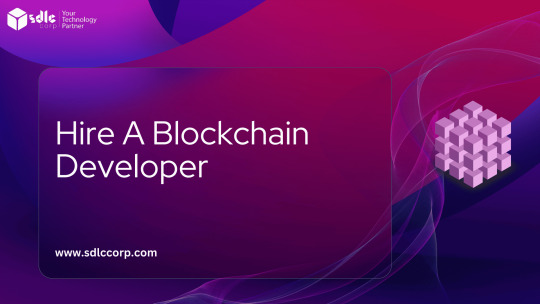
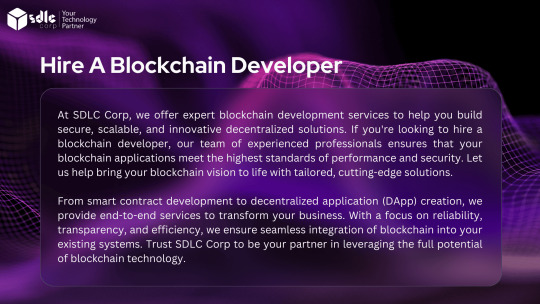
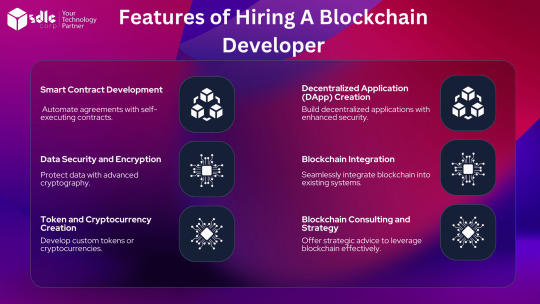
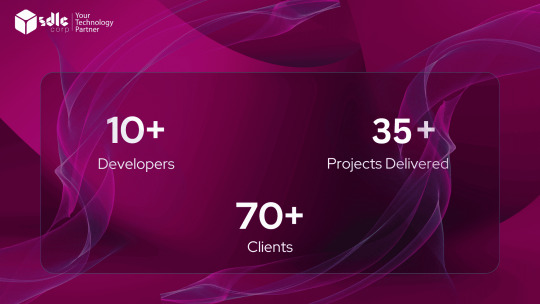
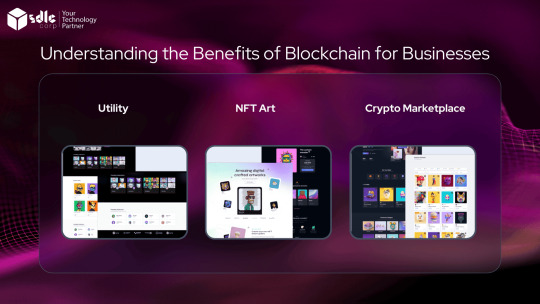
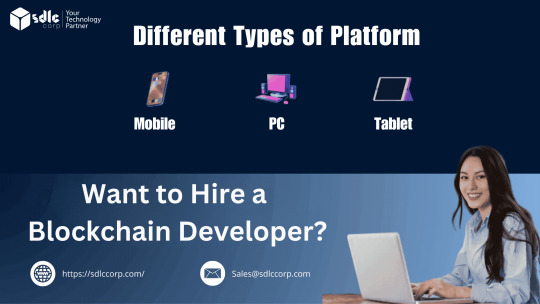
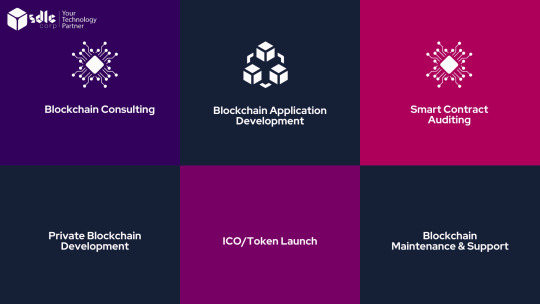
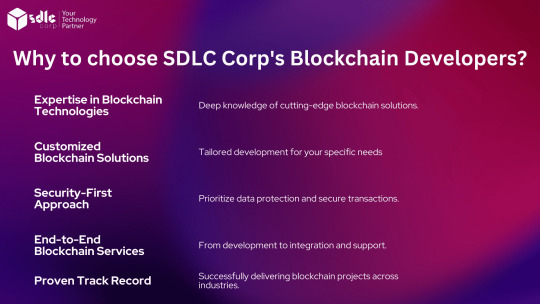
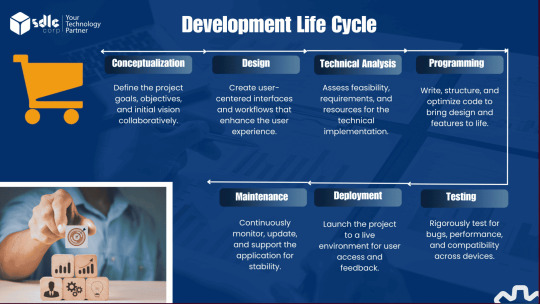
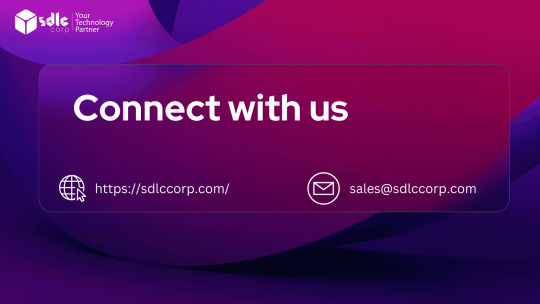
SDLC Corp engaged a team of expert Blockchain Developers to create a decentralized application (dApp) leveraging blockchain technology, aimed at enhancing data security and transparency for the healthcare and finance sectors. The project involved developing smart contracts on the Ethereum blockchain, with the Blockchain Developers ensuring that transactions were secure, immutable, and could be seamlessly integrated with existing systems.
The solution was specifically designed to streamline data management, improve compliance with regulatory standards such as HIPAA and GDPR, and mitigate risks associated with centralized data storage. Through the innovative use of blockchain, Blockchain Developers enabled the secure sharing of sensitive information, building a transparent platform that empowered clients to enhance operational efficiency, reduce costs, and foster trust with stakeholders. By incorporating blockchain technology, SDLC Corp delivered a forward-thinking solution that positioned the client as a leader in adopting next-generation technologies.
Challenges:
SDLC Corp, a leading tech solutions provider, undertook the development of a cutting-edge blockchain-based project aimed at transforming data security for healthcare and finance sectors. The goal was to create a decentralized application (dApp) that enabled secure data sharing, ensuring transparency and immutability of transactions through smart contracts and blockchain technology. However, several challenges surfaced during the development phase.
The primary challenge was the complexity involved in selecting the right blockchain platform. Given the project’s scope, the team had to decide whether to build the solution on Ethereum, Solana, or another blockchain network, each offering different advantages and limitations in terms of scalability, transaction speed, and cost. Additionally, the team faced issues related to smart contract development, as the dApp needed to ensure the highest level of security and be resistant to potential vulnerabilities such as reentrancy attacks or exploits.
The project’s requirements also included developing a seamless integration between the blockchain and traditional systems, such as healthcare data management software and financial transaction systems, all while complying with stringent regulatory standards such as HIPAA and GDPR. This presented both technical and legal challenges. Moreover, the team needed to ensure that the blockchain solution could handle a large number of concurrent transactions without compromising on performance or security.
Solution:
To overcome these challenges, SDLC Corp adopted a structured approach, leveraging blockchain expertise and advanced technologies to build a robust solution.
Platform Selection and Smart Contract Development: The team conducted an extensive evaluation of multiple blockchain platforms, ultimately selecting Ethereum for its strong ecosystem and security features. Solidity was used to develop the smart contracts, while development was carefully aligned with Ethereum's gas limits and transaction fees to optimize cost efficiency. The smart contracts were designed to automate key functions, such as authentication and data sharing, in a trustless, transparent manner.
Integration with Existing Systems: SDLC Corp’s team worked closely with healthcare and finance domain experts to ensure seamless integration between the blockchain-based solution and legacy systems. APIs and middleware were developed to bridge the gap between the decentralized network and centralized systems, ensuring smooth data flow and enabling secure, real-time transactions.
Security and Compliance: Given the critical nature of the data being handled, the development process included a robust security framework. The team implemented various cryptographic techniques and conducted thorough security audits of the smart contracts and overall infrastructure to prevent exploits. Furthermore, SDLC Corp ensured that the blockchain solution met all relevant regulatory requirements by working with legal and compliance experts throughout the development process.
Scalability and Performance Optimization: To address scalability concerns, the team leveraged Layer 2 solutions and off-chain storage where appropriate. This ensured that the blockchain network could handle high throughput and large-scale data processing without compromising performance or security.
#blockchain#blockchain developer#blockchain developement#blockchain development company#blockchain development services#blockchain app development#blockchain services
0 notes